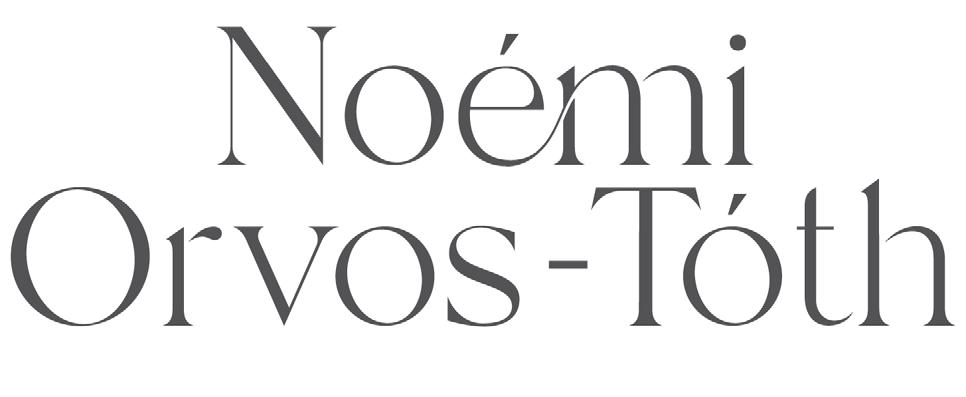Inherited Fate















Cornerstone Press
UK | USA | Canada | Ireland | Australia India | New Zealand | South Africa
Cornerstone Press is part of the Penguin Random House group of companies whose addresses can be found at global.penguinrandomhouse.com
Penguin Random House UK , One Embassy Gardens, 8 Viaduct Gardens, London sw11 7bw penguin.co.uk global.penguinrandomhouse.com
First published in Hungary by Helikon/Libri, 2023 First published in the UK in 2025
Copyright © Noémi Orvos-Tóth, 2025
Translation © Katalin Rácz and Thomas Mansell, 2025
The moral right of the author has been asserted
Penguin Random House values and supports copyright. Copyright fuels creativity, encourages diverse voices, promotes freedom of expression and supports a vibrant culture. Thank you for purchasing an authorised edition of this book and for respecting intellectual property laws by not reproducing, scanning or distributing any part of it by any means without permission. You are supporting authors and enabling Penguin Random House to continue to publish books for everyone. No part of this book may be used or reproduced in any manner for the purpose of training artificial intelligence technologies or systems. In accordance with Article 4(3) of the DSM Directive 2019/790, Penguin Random House expressly reserves this work from the text and data mining exception.
Typeset in 13.5/16pt Garamond MT Std by Jouve (UK), Milton Keynes Printed and bound in Great Britain by Clays Ltd, Elcograf S.p.A.
The authorised representative in the EEA is Penguin Random House Ireland, Morrison Chambers, 32 Nassau Street, Dublin d02 yh68
A CIP catalogue record for this book is available from the British Library isbn : 978–1–529–94131–9 (hardback) isbn : 978–1–529–94132–6 (trade paperback)
Penguin Random House is committed to a sustainable future for our business, our readers and our planet. This book is made from Forest Stewardship Council® certified paper.
When someone comes to see me and we start talking about their troubles or recurring negative patterns in their lives, in most cases I soon get the feeling that we need to go back in time.
For some people, this can seem strange or even nonsensical. I well remember a man who came to see me a few years ago who tinkered with his watch while eyeing me distrustfully. His problem was that he kept calling for an ambulance or asking his wife to take him to A&E because he thought he was having a heart attack. Each time, the doctor set his mind at rest, telling him it was a ‘false alarm’, and sending him off with some advice about changing his way of life – less salt, more exercise, that kind of thing. However, on the latest such occasion, the doctor patted him on the back and said, ‘Listen, your heart is completely fine! You should go and see a psychologist instead!’ So he came and sat opposite me to find out what might be causing his panic attacks and if anything could be done about them. However, before we could begin, he strictly forbade us from dredging up the past. ‘I’m an optimist,’ he said. ‘I like looking ahead. Let’s talk about the future!’
I often encounter similar reservations. Most people
think that it’s pointless delving into the past since it cannot be changed. This comes from the conviction that old wounds can only be cured if we rewrite the history of our lives, and since such rewriting is impossible, it’s not worth stirring up the past. ‘What’s done is done’ is the often repeated, well-meaning advice. ‘Forget about it!’ However, that would be a mistake.
It is true that we cannot undo what has happened, but if we understand it, it can help give a different shape to the present and to our future. As Winston Churchill observed, ‘The longer back you can look, the further forward you are likely to see.’ You must care about the past, because only by understanding it thoroughly can you arm yourself for future challenges.
Of course, it’s not always easy to recognise the connections. A sceptic might ask how much events that happened decades ago have to do with our present sufferings. In most cases, however, the answer is ‘a lot’. Some people are unwilling to face the past because they feel they could not cope with some unknown information turning up – of skeletons suddenly falling out of the closet. For example, one of my patients vehemently protested against therapy in an altered state of consciousness – I deliberately don’t use the word hypnosis as it involves so many misapprehensions – because he was afraid of ‘some monstrosity hiding in the depth of [his] unconsciousness’. But this fear consumed far more energy than he would have needed to cope with any potentially surfacing horror. Another characteristic
reservation arises from how some people imagine therapy. Many still think that a psychologist acts like a judge, their main task being to assess who is at fault in a given situation and to attribute blame – and they would not like it if it turned out to be them. Recently, a couple began their session by saying that they had come so that I might listen to each of them and then ascertain who was the fool. I had to disappoint them, because as a psychologist I don’t have a radar for detecting fools, and anyway I wouldn’t like to label anyone. Others actively want to avoid situations where exploring the past would require them to re-evaluate relationships with their relatives. One woman, for example, declared in our very first session that psychologists always blame the mother for everything, whereas her mother was wonderful, so I could forget about her saying anything bad about her. But loyalty to one’s family is such a strong dictate that it can literally prevent us from seeing what has happened to us, and from understanding connections in our lives. Let me just say, by the way, that this doesn’t only affect lay people. I was once present with a group of people who work in the caring professions who were discussing grievances caused in childhood by parents. It was an upsetting conversation. The next session that day began in complete silence, with no one willing to say anything – until finally someone blurted out their remorse for ‘exposing’ their parents in the previous session. Even as adults, it can feel like a betrayal if we speak about pain felt in childhood, if we bring up
deficiencies and disappointments in the parent– child relationship.
We need to put aside such misgivings. Without exploring the past, we can only dimly surmise who we are and why we lead the precise lives we do. In order to understand ourselves, to find out why we falter, to explore and possibly explain our anxieties, flagging spirits and failures, or to understand why we constantly repeat the script of our unhappy relationships, it is not enough merely to examine our own lives. The experiences, incidents, fears and sufferings of our parents and grandparents, and even ancestors we have never met, influence our fate. If these legacies remain in the concealed corners of the familial unconscious, they will prevent us from living a free life. It is essential to think of ourselves as part of an extensive social and family network and to discover how many threads the past weaves through our present. We must recognise that if something traumatic happened to one of our ancestors, its effects will be detected in the everyday lives of their descendants, years or even decades later. This is no longer an esoteric view – ‘I believe it if I want to’ – but a fact backed up by scientific research.
This book invites the reader on a journey of selfawareness that spans generations. It encourages you to be brave and to explore your family’s long-buried stories, to set off on densely overgrown paths, cast light in dark corners, and face the forces that are at work in your life. I am convinced that no one’s fate can be fully understood without taking into account transgenerational influences,
and that if you explore your ancestors’ history you can discover the key to positive change.
At the end of each chapter, I have collected some questions, the answers to which can help us to develop our self-awareness more thoroughly. They may take us closer to the hidden layers of the self and clarify our parents’ and grandparents’ behaviour and emotional reactions, as well as their decisions.
But you were born And you’re neither blind nor a fool; Once you’re here, Don’t let them stop you short!
Péter Sziámi Müller, ‘If you’d been a baby with foresight’2
As a child in the 1970s and 1980s, I remember listening a lot to songs by the popular Hungarian singer Zsuzsa Koncz. We would sing along with her as the black vinyl spun round on the record player. ‘Mama, kérlek’ (‘Please, Mum’) was my favourite: I still get goose pimples when I hear János Bródy’s brilliant lyrics. Great artists – poets, writers or lyricists – know as much about the human soul as a psychologist, if not more, but they approach things from a different angle. ‘Mama, kérlek’ put into words life’s fundamental question, singing ‘I never asked you to give me life,’ and asking that before she die ‘I need to know why I’m alive.’
Why are we here? For what purpose were we born? Did my parents want me? In the 1980s, when the song came out, I had no idea how often I’d be
searching for answers to such questions in my work as a psychologist.
As soon as therapy begins, I try to discover what my clients know about the events surrounding their conception. Who were their parents? What was their relationship like? What kind of lives did they lead? Were they looking forward to the birth or was it a mistake, an accident? Was the child born following an unplanned pregnancy, which can be something of a burden? Ideally, a child arrives in the world thanks to the deep commitment and mutual desire of two mature adults who love each other and who are emotionally and financially secure, yet life doesn’t always spoil us with such ideal scenarios.
Why is our conception such an important topic? How does what happens at the very beginning of our lives affect our future?
Our early development takes place in the interaction between our genes and the environment, and the very first environment we encounter is our mother’s body. For a long time it was thought that the only growth that took place in the womb was physical, but thanks to modern research into infancy, and in particular to ultrasound tests, it has become clear that very important developmental processes, about which we previously knew little, also take place there. The embryo is alert, listening, responding, and above all learning . Its immature nervous system stores experiences. The maternal body not only provides nutrition but also passes on the mother’s emotional state of mind: if the mother feels
good, the embryo also swims in happiness hormones, whereas if she is tense and nervous the embryo also receives her stress hormones. These biochemical messages change into memory imprints, which are stored in the form of physical feelings and visceral impressions. We are not talking about conscious memories that can be put into words, but rather experiences at a cellular level.
Examining the influence of the mother’s body on the embryo, Vivette Glover, professor of perinatal psychology at Imperial College London, claims that a mother’s emotional state affects the development of the embryo’s nervous system. If the mother is stressed, the increased levels of cortisol can cause structural and functional changes in the embryo’s brain, detected mostly in the region known as the hippocampus. Situated in both cerebral hemispheres, roughly behind the temples, and somewhat resembling a seahorse ( hippocampus in Latin), this region is primarily responsible for learning and memory and also for the regulation of emotions and motivation. Research by Glover and others has proved that due to the different development of their nervous systems, children of mothers with depression and anxiety are more likely to go on to suffer symptoms of depression and anxiety themselves; they are also more likely to have attention deficit disorders, learning difficulties and cognitive problems. Stress endured as an embryo may affect someone’s whole life and fate. Scientific research now supports the advice
given by Aristotle more than two thousand years ago, when he warned pregnant women against worrying on the basis that the baby developing in their womb absorbs a great deal, just as a plant does from the soil in which it is growing.
Some aspects of becoming a mother are not considered fit topics for discussion, and often we dare not talk about them for fear that some people may find the whole truth shocking. It is commonly assumed that every woman awaits the birth of her baby with exuberant joy, and if someone – even only in a passing moment, or in certain periods of her pregnancy – feels anything other than this, she exposes herself to others’ angry disapproval. The late Hungarian psychologist Péter Popper, who, for me, was one of the most intrepid and insightful explorers of the human soul, asked whether it was true that every father and mother loves their child, discussing it in the following way:
Psychologists’ surgeries are full of broken or breaking relationships, because people dutifully pretend to love their children at all times and under any circumstances. It is a social obligation! What kind of a monster of a mother or father doesn’t love their own child! However, it is perfectly possible to care properly for a child and treat it with kindness (for example, for the sake of decency or goodwill, or out of a sense of responsibility) even if one does not love the child but accepts the situation – those are the cards life has dealt you.3
International surveys echo Popper’s words, with results showing that 56 per cent of couples react to a positive pregnancy test with fear. Of course, in most cases, the initial shock dissipates, yet more pregnancies than we might like to think are accompanied with negative emotions. According to one American study, more than one third (!) of children are born from unwanted pregnancies, even though contraceptive pills and condoms are widely available in Western societies. However, sweetsounding principles are significantly different from practice in this field, too. (In its annual report for 2022, the UN Population Fund refers to a neglected crisis in unwanted pregnancies, which affects not only the individual, but society as a whole.4)
But what must the situation have been like before the 1960s, when contraception was harder to procure and abortion was illegal? I think we can venture that in every generation significant numbers of babies came into the world whose parents had not wanted them at all. One of my patients comes to mind. Her mother often told her, ‘If you hadn’t been born, my life would have been different. I wouldn’t be rotting away in this damned marriage with your dad.’ No wonder it wasn’t easy for her to have a satisfying relationship; she simply did not believe that anyone needed her or that anyone would approach her with love.
As early as 1929, the renowned Hungarian psychoanalyst Sándor Ferenczi, a disciple of Freud, considered how a mother’s rejection affected a child. In his study
‘The Unwelcome Child and his Death-Instinct’, 5 Ferenczi claims that there is a destructive instinct, the ‘death instinct’, in every embryo, and that maternal love is able to reduce and calm its harmful power. If our mother thinks of us lovingly, it makes our existence worthwhile and gives us purpose. However, if pregnancy is not a joy for her, if our mother radiates rejection towards us and this persists, it makes our beginning difficult. The death instinct is not counterbalanced, and life is imbued with feelings of insecurity and distrust. This situation may improve later if there is at least one other person in our environment with a positive image of us. But if there is no such person, the possibility of having really deep and harmonious relationships becomes much more difficult.
Ferenczi thought that unwanted children developed more slowly, that they would become oversensitive and pessimistic as well as more inclined to psychosomatic maladies. He believed these to be manifestations of the death instinct, a kind of unconscious tendency towards self- destruction. According to Ferenczi, as adults unwanted children are more susceptible to suicide and criminal inclinations, as though someone whose existence was unwelcome would be more inclined to self-harm, as if satisfying the parental expectation. It is worth repeating that this study was published in 1929. For nearly a century, therefore, psychologists have been concerned with the possible consequences if the animating power
of love is absent from the very first relationship of our lives.
In Ungewollte Kinder (Unwanted Children ),6 Helga Häsing and Ludwig Janus write that if the mother wanted the pregnancy the embryo would develop in a ‘blissful primal state’, whereas if she rejected it, the child would develop a very deep, archaic guilty conscience. They would unconsciously feel that they are doing something wrong, and therefore try to annihilate themselves. In Rainbow States of Consciousness, 7 Andrew Feldmár talks about his experience of working with patients who survived multiple attempts at suicide. He found that several of them always tried to end their lives in the same month of the year and, analysing his patients’ lifelines, Feldmár realised that each suicide attempt took place during the period corresponding to the three months following their conception, the so-called first trimester – the period when unwanted pregnancies are usually terminated. He decided to talk to his patients’ mothers and ask them whether they had tried to have an abortion: it turned out that all of the mothers would have liked to have ended their pregnancy. Although these are individual cases, they still make one think. How is this gruesome coincidence possible when the young people concerned had no information about those past events? Could they somehow ‘remember’ the threatening experience during foetal life? Did the mother’s emotions and thoughts reach them via an invisible channel of communication? Did they identify
with the aggression directed at them and, having grown up, try to harm themselves? It’s possible – but then how can we explain the coincidence in time? Prominent psychotherapist Anne Ancelin Schützenberger thought that the ‘anniversary syndrome’ might lie behind this – the phenomenon whereby anniversaries of incidents that happened to an ancestor or significant events in their lives (for example, an accident or a death) could have a magnetic force and evoke repetitions.
In recent decades, several surveys have examined what happens when the earliest bond between mother and child is damaged. The ‘Prague Study’8 by David, Matějček and Dytrych is perhaps the most famous of these. The researchers followed 220 children for the first thirty-five years of their lives, all of whom had been born despite their mothers having applied for abortions (appearing twice before the relevant committee between 1961 and 1963). The authors wanted to understand how this clear and open rejection affected the children’s future lives. The results showed the importance of the emotions expressed towards us since our conception. Although unwanted children were no different in their intellectual abilities (IQ) from their peers, they were poor achievers in several subjects compared to those in the control group who were wanted in pregnancy. They lagged behind in their social skills, they fitted into the community with more difficulty, and they were the children their peers were reluctant to make friends with – as if maternal rejection returned in their later human relationships. Their
teachers and mothers were dissatisfied with their behaviour and diligence, and so they came to be labelled ‘bad children’. These early classifications are deeply engraved in the image we form of ourselves. The negative adjectives heard in our childhood can accompany us even to the end of life. Children of unwanted pregnancies had problems regulating their emotions and found it harder to control their temper. As adults, almost twice as many became alcoholics and nearly three times as many committed crimes compared with the members of the control group. Many of them thought that they struggled in vain for acceptance and that however much they tried to accomplish something, things would always go wrong. ‘Even my mother didn’t love me: there must be something wrong with me,’ they must have thought. If someone’s soul is filled with feelings of worthlessness, it’s no wonder that as adults they will start any relationship feeling insecure and afraid, or refuse to let anyone close to avoid being further wounded. For such a person, love becomes a mirage: they either pursue it in despair or sometimes don’t even bother. So perhaps understandably the unwanted children in the Prague Study experienced much disappointment and failure, and many break-ups in their relationships as adults. Their first sexual encounters (which generally determine the quality of future relationships) were usually superficial, and their later affairs also tended to be fleeting or short-lived. They offered their bodies almost automatically for temporary kindness and the illusion of love, but were not able to form deep and lasting bonds.
Several felt unhappy in their marriages, and they were more likely to get divorced.
An initial lack of love acts like a thread that runs through our lives and it is difficult to unpick. Having once been unwanted in this world, we struggle ever to believe that we have a place in it, that we are owed honour and acceptance and can experience real, deep intimacy. Of course, this rarely comes to the surface: what we notice instead is that we repeatedly falter, our relationships go awry, we lose hope, nothing excites us, or we lead a self-destructive life.
Recently I noticed a homeless person sitting on a bench near where I live. He was there in the morning when I went to work and still there when I returned home in the evening, sitting peacefully, listening to his radio. One morning when I saw him in the same place, I spoke to him. He told me that he had lived on the street since 1994. He had lost his job when the factory where he had been working closed down. Rather than try to look for work elsewhere, he simply gave up because he didn’t think it was worth striving for anything or that his actions would ever achieve a positive outcome. The long and the short of it was that the man was an unwanted child. ‘My parents never wanted me: for them, I was just a pain in the arse,’ he said, with a dismissive gesture.
When we cannot comprehend someone’s ‘laziness’ and ‘lack of motivation’, it is worth casting an eye over the life they have experienced so far. How many people
had given up on them by the time they gave up on themselves?
But how does being ‘unwanted’ have an effect even across several generations? Mark Wolynn, an expert on inherited family traumas, says that aspects of our grandmother’s maternal care are passed on to us. Our grandmother’s childhood sorrows, difficulties and sufferings influenced how she later treated our mother, and our mother in turn passed these influences on to us. If we don’t manage the trauma of rejection, we pass it on like a hot potato to our children, and they to our grandchildren.
In a group session, Ágota, a softly spoken, reserved woman in her fifties, complains of apathy and being tired of life. She drags herself along sorrowfully from one day to another and no longer expects or wants anything. She says the struggle of constantly trying to live up to expectations has exhausted her. Her motivation has petered out, she does not want to know the future. ‘Life for me has been used up,’ she says, and whoever sees her cannot doubt it. Her body has been drained of energy: her lips curve downwards, her shoulders droop forward, and her eyes bespeak utter weariness. She herself does not understand why she is like this: after all, she has a husband who loves her and a daughter who is doing well; she has a job, a nice house and a garden. On paper, at least, she has everything she needs to be happy; the soul, however, couldn’t care less.
In my work, I have observed that emotions often erupt seemingly without warning or explanation. We look for the catalyst, but even if we find something, we somehow don’t feel it’s the whole picture. At such moments, it’s a good idea to dig a bit deeper and conduct a search into our ancestors.
Ágota and I begin treating the matter on a transgenerational level. She draws up her family tree and searches archives and church documents for faded papers. She comes across some interesting information in a church register of births, a remark after her mother’s name: illegitimate. How could this be? She had never heard anything about this before. Her mother is no longer alive so cannot be asked, but Ágota doesn’t give up. She puts questions to members of the family until at last a relative tells her the story she wants to know. Her grandparents were teenagers when they fell in love. They were in the grip of passion and, presumably knowing little about contraception, the fifteen- year- old girl became pregnant. She only found out when she started to feel the baby move. A huge scandal broke out in the village and everyone talked about the girl who had lost her honour. Her parents, who were unsociable and loveless people, utterly humiliated her and threatened to disown her. She had to move out to the stables and was given hardly anything to eat. The young couple applied to marry with an exemption from the age of consent, but the baby was born before the permission arrived. This was the cause of illegitimacy.
Later, when they got married, they made the child ‘legitimate’, yet that only resolved the legalities. The child (Ágota’s mother), who came unexpectedly and too early, was the target of aggressive emotions all her life. Every move she made was criticised. Rare indeed were the days that she was not scolded or thrashed. (Research also shows that unwanted children suffer far more abuse in their family, which they pass on to their own children: several investigations into the frequency of transgenerational transfer have confirmed that about a third of formerly abused children will themselves become abusing parents.) So Ágota’s mother grew up in that traumatising environment and could never shake off her memories. The childhood pattern of damage stubbornly persisted: the abused girl became an abusing mother. As a result, Ágota also suffered in her childhood: sometimes she was hurt by words, sometimes beaten with a belt. When she remembers those years, she cannot recall many cheerful moments. She says she did nothing but try to meet expectations and appease her constantly angry, emotionally rigid and rejecting mother, with little success. Even as a young girl she had to run the entire household. She washed the clothes, cleaned the house, fed the animals, and made jam in the summer. Every day she dreaded what mistake her mother was going to pick on. She decided that once she grew up she was going to flee, to go somewhere far away and to do her best to avoid becoming like her mother.
Ágota more or less managed to keep her pledge: in fact, she moved to the other end of the country. She
met a steady, intelligent man and she told him about her childhood. He realised that living in Ágota’s soul was an abused little girl who, from time to time, had to be treated gently, with empathy. When their child was born, Ágota found that her anger sometimes rose when the baby was crying. In those moments it was as if her mother’s spirit replaced hers. She feared that one day she would lose control of herself and destroy the child. Ágota and her husband agreed that if he saw signs of tension in her, he would immediately remove the baby so she could not hurt her. This was the ‘trick’ for her not to pass on the transgenerational pattern and not make her own daughter a victim. It proved effective and their daughter grew up in a more or less harmonious atmosphere. Now grown, she had been living and working abroad for a year, and because of the distance she and Ágota could only stay in touch on Skype. And here something interesting comes to light: Ágota’s depression began more or less when it became clear to her that her daughter would now only come home as a visitor. Although she was sure that her daughter was getting on well, she felt destroyed by losing her. ‘She doesn’t want me either!’ an inner voice whispered. ‘My mother didn’t want me, and now neither does my daughter!’ She was struck by a dreadful pain, which was later replaced by indifference and resignation.
In groupwork, we return to her childhood experiences and start working on the feelings of rejection she has carried since then. We role-play the inner drama of her